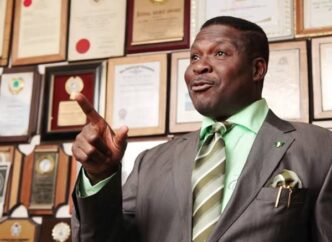By Prof. Mike Ozekhome, SAN, CON, OFR, LL.D
Introduction
The last may not have been heard of the somewhat controversial Continuing Professional Development (CPD) Programme which the Nigerian Bar Association (NBA) appears determined to institutionalize, notwithstanding the resistance of not a few members of the Association whose voices have obviously been drowned. The pushback has however persisted despite the recent endorsement of the programme by the General Council of the Bar (GCB) which has thrown its considerable weight behind the on-going implementation of the Programme.
Laudable as the Programme undoubtedly is however, lingering questions persist about the legal capacity of the GCB to enact the relevant enabling statutory provisions concerning the CPD. Such cannot be swept under the carpet, dismissed with a wave of the hand or wished away simply because of the programme’ssalutariness and honest intendment. No. That would be ostrich-like and unbecoming of our noble profession whose members pride themselves as being the sentinels and guard-rails in the larger polity regarding adherence to the rule of law and due process in carrying out things. We should start the cleansing and self-deodorisation from home by embracing abandonment of self-introspection and examination.
Nagging Questions
Are there inherent flaws or defects in the CPD’s statutory provisions which might impinge on its validity or rob it of legitimacy? Can the GCB validly regulate the right of a lawyer who has been duly called to the Bar and is up-to-date in the payment of his practising fees as and when due, as the CPD provisions of the Legal Practitioners Rules of Professional Conduct has done? As between the National Assembly and the GCB, which body is constitutionally competent to make the CPD provisions? To the extent that Section 12(4) of the Legal Practitioners Act simply empowers the General Council of the Bar to “make rules on professional conduct in the legal profession”, can it be extended to include the power to prescribe a course of study, the successful completion of which is a prerequisite for a lawyer’s competence or qualification to continue to practice?
Having regards to Item 49 of its Exclusive Legislative List of the Constitution which empowers only the Assembly (in) to regulate “professional occupations as may be designated by (it)”, did the GCB not act in excess of its constitutional powers by enacting Rule 11 of the Rules of Professional Conduct for Legal Practitioners, 2023 (RPC), which contains the CPD prescriptions? We shall attempt some answers starting with the latter.
“11 —(I) A lawyer who wishes to carry on practice as a legal practitioner shall participate in and satisfy the requirements of the mandatory Continuing Professional Development (CPD) Programme operated by the Nigerian Bar Association.
(2)The activities in which a lawyer is required to participate for the purpose of the CPD Programme of the Nigerian Bar Association shall include—
a)attendance and participation in accredited courses;
b)lectures, seminars, workshops and conferences law approved by the Nigerian Bar Association.
c)writing on the law and its practice in books or journals and Newspapers approved by the Nigerian Bar Association.
d)(d) study towards professional qualifications approved by the Nigerian Bar Association: and
e)(e) other approved means of acquiring legal professional knowledge and experience.
(3)A lawyer shall be certified as having satisfied the requirement of the CPD Programme if and only if during the relevant year he earns the number of credit hours of participation in the programme which is required under the rules or guidelines made by the Nigerian Bar Association.
(4)Except as may be provided in the rules or guidelines of the Nigerian Bar Association, the number of credit hours required for each year shall be as follows—
a)for lawyers from Admission up to 5 years – 24 hours ;
8b)for lawyers just over five years up to ten years – 18 hours; and
c)for lawyers above ten years – 12 hours.
(5)The Nigerian Bar Association shall establish a Continuing Professional Development Department in its office for the operation of the Programme.
(6)The Nigerian Bar Association shall make rules or guideline for regulating the operation of the CPD Programme and such rules or guideline may provide for—
a)the number of credit hours of participation required of a legal practitioner;
b)the types of activities and studies that are acceptable for earning the credit;
c)persons that may be exempted from the requirements of the Programme; and
d)other matters which in its opinion are necessary for the proper operation of the Programme”
As for the power of the GCB to make rules regulating the conduct of lawyers (vide section 12(4) of the LPA), professional conduct has been defined as “the way, from an ethical point of view, a person behaves professionally towards clients, the employer, other colleagues, citizens in general, the community, the professional group, the environment, other species, and future generations”. See (https://www.igi-global.com/dictionary/professional-conduct/23716). By this definition it is surely far-fetched to conclude that the GCB possess the requisite statutory mandate to regulate or prescribe a course of study of continuing professional development which is the subject of section 11 of the RPC. However, that is not all as we shall see below.
The Legal Regime
The Exclusive Legislative list of the Constitution empowers the National Assembly (NASS) as the sole body responsible for regulating all professions in Nigeria (including, of course, Law). Section 8(2) of the Legal Practitioners Act (LPA) provides, inter alia, that “No legal practitioner shall be accorded the right of audience in any Court in Nigeria in any year unless he has paid to the Registrar in respect of that year, a practice fee as may be prescribed time to time in accordance with the provisions of the section”.
The Registrar referred to in the above section l is the Chief Registrar of the Supreme Court (Section 24 of the LPA). From the foregoing, it is clear that the provisions of Rule 11(1) of the RPC which purports to make participation in the CPD a condition precedent to be satisfied by a lawyer before he or she can continue “to carry on practice as a legal practitioner” are at odds and definitely contrary to the provisions of section 8(2) of the LPA which simply make the payment of annual practising fees the sole criterion to practise as a Barrister.
Resolving the Conflict
In the above circumstances, the obvious question to be answered is, which as between the provisions of the LPA and RPC supersede the other and which ought to prevail? The answer is, it is submitted, quite obvious: the latter, the LPA, supersedes. This is because it is trite that a subsidiary instrument such as the RPC derives its force legitimacy and validity from its principal or enabling statute and cannot therefore derogate from or contradict same: See THE GOVERNOR OF OYO STATE & ORS. V. OBA OLOLADE FOLAYAN(1995) LLJR-SC; PRINCE BURAIMOH OLANREWAJU V. ALHAJI AMODU OLALEYE OYEYEMI & ORS (2000) JELR 43846 (CA) and KENNEDY v INEC (CA/PH/EPT/350/2007) [2009] NGCA 1 (18 January 2009).Surely, the tail cannot wag the dog, nor can the agent be mightier than the principal.
The Doctrine of Covering the Field
Furthermore, under the doctrine of covering the field, where the National Assembly has enacted a law in respect of a particular matter, no subordinate legislative body can make any other law which has the effect of overriding a law validly enacted by the National Assembly. See HON. MIN. OF JUSTICE & AGF VS. AG OF LAGOS (2013) ALLFWLR Pt.704 pg. 1 and ISHOLA vs. AJIBOYE (1994) 6 NWLR pt. 352 pg.506@ 573D, where the Supreme Court respectively held with great erudition as follows:
–“(the) doctrine of covering the field postulates that where a federal Constitution or a federal enactment has already covered a particular legislative field, no State or even Local Government Law can be enacted to cover the same field already covered by the Constitution or the federal enactment”;
-“The Constitution is supreme not only when another law is in consistent with it but also when (that other) law seeks to complete with it in an area already covered by the Constitution”.
The Supremacy of the Constitution
The supremacy of the Constitution has severally been emphasized by the appellate courts. For instance in UDEOGU V FEDERAL REPUBLIC OF NIGERIA & ORS. (SC. 264/2012) [2016] NGSC 29 (17 March 2016), the court struck down a conflicting section of the Administration of Criminal Justice Act. Similarly in INSPECTOR-GENERAL OF POLICE V. ALL NIGERIA PEOPLES PARTY AND ORS (2007) AHRLR 179 (NGCA 2007), the court held that the provisions of the Public Order Act requiring a police permit for rallies is unconstitutional and void. Again in ATTORNEY-GENERAL OF LAGOS STATE VSTHE ATTORNEY GENERAL OF THE FEDERATION (2003) 35 E-WRN / 01 (SC), the court declared the Federal Government‘s withholding of federal allocations to Lagos State unconstitutional.
Conclusion
The NBA/GCB’s Continuing Professional Development (CPD) Programme as laudable and salutary as it is suffers from the inherent legislative deficiency and incapacity of the GCB to enact same. Having regard to the combined enabling statutory provisions, it is submitted that only the National Assembly has the sole capacity to legislate on those items. We must look inwards and tell ourselves this home truth, lest we be admonished with the popular cliche, “physician heal thyself” when another aggrieved legal practitioner challenges its validity.
Section 12(4) of the Legal Practitioners Act simply empowers the General Council of the Bar to “make rules on professional conduct in the legal profession”. No more. Can this be extended to include the powers to prescribe a course of study, the successful completion of which is a prerequisite for a lawyer’s competence or qualification to continue to practise? Conduct is defined by the definition preferred by the Oxford Dictionary is simply “the manner in which a person behaves, especially in a particular place of situation”. This is precisely what the General Council of the Bar was empowered to do- prescribe rules of professional conduct of behavior in the Legal profession; not to prescribe a compulsory course of study. The latter is clearly ultra vires its powers.
Gatekeepers News is not liable for opinions expressed in this article, they’re strictly the writer’s





